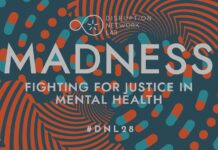Why Isn’t There a Popular Hashtag for Involuntary Commitment?
As uses of psychiatric force expand, can social media be better used to focus critical attention?
Ten Years of Rocking the Boat: Reflecting on Mad in America’s Mission and Work
Continuing our 200th podcast, staff members join us to discuss reinvigorating MIA continuing education, science writing and blogs, personal stories, community commenting and family resources.
Changing Narratives: Reflecting on Mad in America’s Mission and Work
For our 200th podcast interview, we are joined by members of MIA staff to reflect on Mad in America's mission and work over the last decade.
And Now They Are Coming for the Unhoused: The Long Push to Expand Involuntary...
Mayor Adams' plan to "involuntarily remove" unhoused people has met with backlash from activists and the unhoused, who say it violates their rights and further entrenches systemic racism.
Books Under Review: Fall 2022
Reviews of three recent books reflecting various perspectives on the mental health system.
Art and Transformation: Creating Justice in Mental Health
An upcoming conference focuses on the perspective of artists and activists in answering what it means to have a just mental health care system: Who decides who is labelled as mad?
David Healy – Polluting Our Internal Environments: The Perils of Polypharmacy
On the MIA Podcast, Dr David Healy discusses World Tapering Day, antidepressant treatment and sensory neuropathy and the difficulties that can be encountered when trying to deprescribe.
The Nurtured Heart Approach Goes Mainstream: Research and Experience Support “Celebrating Greatness in Every...
The Nurtured Heart Approach represents a massive shift in thinking—about schooling, about children and how to raise them, about how we regard those with intensity, and about the medical model pathologizing them.
Breaking Academia’s Silence on Inpatient Psychiatry: An Interview with Researcher Morgan Shields
Morgan Shields discussed her experiences in inpatient psychiatry and her efforts to bring patient-centered care to this oft-neglected field.
The Serotonin Zombie: Authors of New Study Try to Breathe New Life into the...
Despite new claims that their study provides "clear evidence" linking serotonin and depression, their data actually supports the opposite conclusion: serotonin levels did not correlate with depression.
Anders Sørensen – Tackling Psychiatric Drug Withdrawal Through Research and in Practice
Anders Sørenson is a Danish clinical psychologist with a special interest in psychiatric drug withdrawal. He has undertaken research which assesses the state of guidance on psychiatric drug withdrawal and paid close attention to tapering methods with the aim of identifying approaches which might make withdrawal more tolerable for people.
A Neuroscientist Evaluates the Standard Biological Model of Depression
Current evidence does not support a biological hypothesis of depression. It is far better predicted by levels of childhood trauma, life stress, and lack of social supports.
Exploring the Fault Lines in Mental Health Discourse: An Interview with Psychologist Justin Karter
Justin Karter discusses his journey to Mad in America, competing models of mental health, and how we navigate these stories in psychotherapy.
Jim Flannery: Sorry It’s Not Funny – Comedy, Hip-Hop and Activism
Born and raised in suburban Weathersfield, Connecticut, Jim Flannery was committed at four mental hospitals across the United States. There he received the best care available in the modern world…torture.
Psychiatry’s Nightmarish 2022 & Its Hysterical Defense Against Criticism
Psychiatry's defenders are open to criticism of psychiatry as long as it stops short of acknowledging the increasingly well-documented reality that psychiatry lacks any scientific merit.
In Andrew’s Honor: Attorney Elizabeth Rich’s Fight Against Unjust Commitments
Anyone detained and then formally committed under Wisconsin’s civil mental health laws can initially be held and forcibly drugged for six long months. Yet, for years, not a single person has been able to appeal the six-month commitments in court.
Thomas Szasz Versus the Mental Health Movement
Unbiased experts must examine the claims and research of psychiatry and issue a report as to whether psychiatry not only has a valid medical basis, but whether this basis justifies the widespread violation of medical ethics and the routine use of imprisonment and torture.
Is Service-User Research Possible in Mental Health? An Interview with Diana Rose
MIA’s Ayurdhi Dhar interviews Diana Rose about producing knowledge with survivors of psychiatry, abuses faced by service users, and what good research would look like.
Our RCT Fetish: How the “Gold Standard” for Research Has Led to A Societal...
After Joanna Moncrieff and colleagues published their study debunking the low-serotonin theory of depression, the editor of Mad in Sweden, Lasse Mattila, wrote Sweden’s...
Jon Jureidini–Evidence-Based Medicine in a Post-Truth World
In this interview, Jon Jureidini talks about the issues with evidence-based medicine and describes what led to the debasement of a system originally conceived to challenge extravagant claims and poor science.
Top 10 Myths About the Critics of Psychiatry
Service-users' experience was at the heart of everything the critics spoke about, as well as the importance of relying on the most up-to-date and accurate evidence.
“Holy Shit!” Psychiatry’s Cognitive Dissonance on Display
Even those who would seek to reform the profession of psychiatry cannot confront the reality that exists in the research literature
Beverley Thomson–Antidepressed: Antidepressant Harm and Dependence
We talk with author Beverley Thomson about her latest book, entitled Antidepressed: A Breakthrough Examination of Epidemic Antidepressant Harm and Dependence.
Psychiatry, Fraud, and the Case for a Class-Action Lawsuit
For decades, psychiatry committed medical fraud when it told the public that antidepressants fixed a chemical imbalance in the brain.
John Read and Jeffrey Masson – Biological Psychiatry and the Mass Murder of “Schizophrenics”
On the Mad in America podcast this week, we hear from the co-authors of a paper published in the journal Ethical Human Psychology and...

































